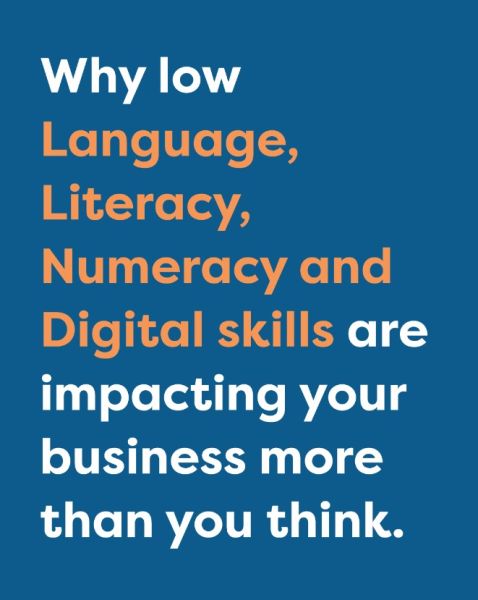National Skills Week: A Message From Our CEO
𝐖𝐡𝐲 𝐥𝐨𝐰 𝐋𝐚𝐧𝐠𝐮𝐚𝐠𝐞, 𝐋𝐢𝐭𝐞𝐫𝐚𝐜𝐲, 𝐍𝐮𝐦𝐞𝐫𝐚𝐜𝐲 𝐚𝐧𝐝 𝐃𝐢𝐠𝐢𝐭𝐚𝐥 𝐬𝐤𝐢𝐥𝐥𝐬 𝐚𝐫𝐞 𝐢𝐦𝐩𝐚𝐜𝐭𝐢𝐧𝐠 𝐲𝐨𝐮𝐫 𝐛𝐮𝐬𝐢𝐧𝐞𝐬𝐬 𝐦𝐨𝐫𝐞 𝐭𝐡𝐚𝐧 𝐲𝐨𝐮 𝐭𝐡𝐢𝐧𝐤.
Today (Aug 25th), is the start of National Skills Week with this year's theme being "Explore ALL Options", and while this week is an excellent opportunity for people to consider what they want to study for their career, it also is a good week to reflect on what is holding your business or your employees back?
Success at work starts long before anyone’s first day on the job. It begins with language, literacy, numeracy, and digital skills (LLND)—the foundational capabilities that help employees understand instructions, communicate effectively, and confidently complete everyday workplace tasks.
Sadly, the state of LLND skills in Australian workplaces is not great and this is affecting more businesses than many would expect.
Recent research highlights the ongoing impact of low language, literacy, numeracy, and digital skills in Australia. The Ai Group’s “Counting the Cost” 2024 report surveyed 251 businesses employing over 291,000 staff. The study suggests that 88% of companies are affected by low levels of language, literacy and numeracy, up from 74% in 2022 and notes the considerable impact on workplace productivity and safety with:
· 63% of companies report poor completion of workplace documents or reports.
· 55% reporting time wasted.
· 49% of staff lack confidence or are unwilling to take on new work.
· 47% experiencing teamwork and communication problems.
· 27% noted potential work health and safety risks.
· 42% of companies identify a need for basic digital skills as essential for workplace participation and future growth.
It should go without saying that LLND skills are critical for business success, employees need strong language and literacy skills to understand instructions, complete forms, and communicate clearly with colleagues and customers. Confidence grows as these skills improve, empowering staff to take initiative. Numeracy underpins everyday tasks such as managing schedules, calculating budgets, or following measurements. With technology increasingly integrated into workplaces, digital literacy is now essential, employees with solid digital skills can navigate systems efficiently, collaborate online, and adapt to new technology.
The statistics underscore the critical need for programs that address LLND deficiencies and support individuals in developing the skills necessary for employment and productivity success, such as the Australian Government's Skills for Education and Employment (SEE) Program.
As a SEE provider, Pivot Training provides tailored support for adults who want to improve LLND skills. Participants gain language and literacy skills for workplace and everyday communication, numeracy skills relevant to real-life work tasks and digital literacy to navigate modern workplaces.
By focusing on practical, real-world applications, we help learners not just improve their skills but also gain the confidence to succeed in employment or further vocational training.
For workplaces this flexible training can be tailored to meet the specific needs of your business and can be delivered directly to your employees in the workplace at a time convenient to you.
To learn more about how SEE can help your business at no cost, visit pivottraining.net.au/see/
The Skills for Education and Employment (SEE) program is supported by the Australian Government Department of Employment and Workplace Relations.
Today (Aug 25th), is the start of National Skills Week with this year's theme being "Explore ALL Options", and while this week is an excellent opportunity for people to consider what they want to study for their career, it also is a good week to reflect on what is holding your business or your employees back?
Success at work starts long before anyone’s first day on the job. It begins with language, literacy, numeracy, and digital skills (LLND)—the foundational capabilities that help employees understand instructions, communicate effectively, and confidently complete everyday workplace tasks.
Sadly, the state of LLND skills in Australian workplaces is not great and this is affecting more businesses than many would expect.
Recent research highlights the ongoing impact of low language, literacy, numeracy, and digital skills in Australia. The Ai Group’s “Counting the Cost” 2024 report surveyed 251 businesses employing over 291,000 staff. The study suggests that 88% of companies are affected by low levels of language, literacy and numeracy, up from 74% in 2022 and notes the considerable impact on workplace productivity and safety with:
· 63% of companies report poor completion of workplace documents or reports.
· 55% reporting time wasted.
· 49% of staff lack confidence or are unwilling to take on new work.
· 47% experiencing teamwork and communication problems.
· 27% noted potential work health and safety risks.
· 42% of companies identify a need for basic digital skills as essential for workplace participation and future growth.
It should go without saying that LLND skills are critical for business success, employees need strong language and literacy skills to understand instructions, complete forms, and communicate clearly with colleagues and customers. Confidence grows as these skills improve, empowering staff to take initiative. Numeracy underpins everyday tasks such as managing schedules, calculating budgets, or following measurements. With technology increasingly integrated into workplaces, digital literacy is now essential, employees with solid digital skills can navigate systems efficiently, collaborate online, and adapt to new technology.
The statistics underscore the critical need for programs that address LLND deficiencies and support individuals in developing the skills necessary for employment and productivity success, such as the Australian Government's Skills for Education and Employment (SEE) Program.
As a SEE provider, Pivot Training provides tailored support for adults who want to improve LLND skills. Participants gain language and literacy skills for workplace and everyday communication, numeracy skills relevant to real-life work tasks and digital literacy to navigate modern workplaces.
By focusing on practical, real-world applications, we help learners not just improve their skills but also gain the confidence to succeed in employment or further vocational training.
For workplaces this flexible training can be tailored to meet the specific needs of your business and can be delivered directly to your employees in the workplace at a time convenient to you.
To learn more about how SEE can help your business at no cost, visit pivottraining.net.au/see/
The Skills for Education and Employment (SEE) program is supported by the Australian Government Department of Employment and Workplace Relations.

